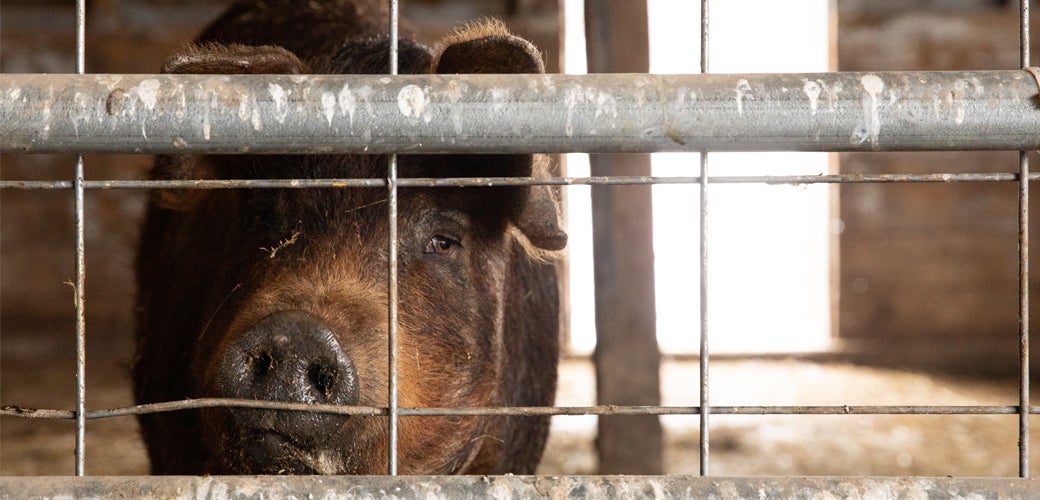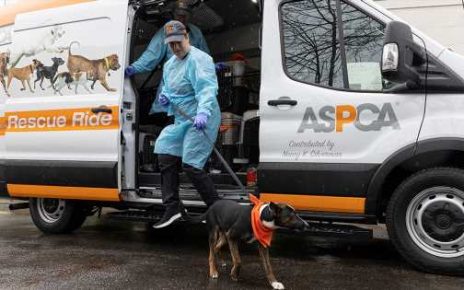
- In the midst of the COVID-19 pandemic, the USDA continues to put animals, workers and consumers at greater risk by allowing slaughterhouses to speed up slaughter lines.
- Faster line speeds mean more suffering for animals and heightened safety risks for food workers and our food supply.
- U.S. Reps. Marcia Fudge (D-OH), Rosa DeLauro (D-CT) and Bennie Thompson (D-MS) recently introduced a bill to prohibit dangerous, high-speed slaughter during the pandemic.
- We need your help fighting for this and other key reforms to prevent animal suffering—please see action steps below.
As the pandemic continues to wreak havoc across the United States, one industry has remained especially irresponsible, doing little to protect its workers from the rapid spread of the deadly virus—the slaughter and meatpacking industry. Amid the COVID-19 crisis, the U.S. Department of Agriculture relaxed protections by allowing a record number of chicken, pig and cattle slaughter plants to start operating at even faster slaughter speeds.
High-speed slaughter lines imperil animals, workers and food safety under normal circumstances. They are especially ill-advised at the height of a pandemic when slower lines are needed to allow plants to effectively meet social distancing, sanitation and safety guidelines.
Fortunately, members of Congress are pushing back on the USDA’s decision to let slaughter plants operate at even faster speeds. Today, Representatives Marcia Fudge (D-OH), Rosa DeLauro (D-CT) and Bennie Thompson (D-MS) introduced the Safe Line Speeds in COVID-19 Act, a bill that would protect animals, workers and consumers by prohibiting these dangerous, high-speed slaughter systems from operating during the COVID-19 pandemic. Rep. Fudge’s bill also directs the Government Accountability Office to conduct a review of actions by the USDA in response to the COVID-19 pandemic to determine their effectiveness in protecting animal, food and worker safety.
Excessive slaughter speeds put animals at greater risk of unnecessary suffering due to mishandling, such as when workers fail to render them unconscious before slaughter. The accelerated slaughter systems that the USDA has approved exacerbate these problems by making working conditions even more unsafe for plant employees, which in turn risks increased violations of the Humane Methods of Slaughter Act and other harms to animals before slaughter.
Additionally, the number of sick workers and deaths linked to slaughterhouses continues to rise steadily. According to the Food & Environment Reporting Network, as of July 8, at least 32,630 meatpacking workers have tested positive for COVID-19 and at least 123 have died.
A recent report from the National Employment Law Project found that all 15 chicken plants that were allowed by the USDA to operate at faster line speeds in April 2020 were cited for worker safety violations by the Occupational Safety & Health Administration and/or are the site of a recent COVID-19 outbreak. Higher-speed slaughter systems also put consumers at risk, with analyses showing that plants operating at higher line speeds have more food safety-related regulatory violations.
The ASPCA applauds Rep. Fudge for standing up to the USDA and introducing legislation that would put a halt to these dangerously fast slaughter speeds. We urge Congress to act quickly to pass this bill to protect workers, animals and consumers.
You can act now and urge your U.S. representative to cosponsor this important bill.
We need your help fighting for this and other key reforms to prevent animal suffering. You can help support our policy work for animals through grassroots advocacy by joining our Regional Advocacy Field Team (RAFT) today.
Source: Read Full Article



